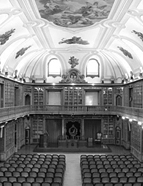

According to Correia da Serra, the specific nature of the object of study of history does not allow for experimentation or the repetition of observations, but rather imposes additional demands on shrewd reasoning. That is why the traces of narratives and monuments are so important, hence the need to preserve primary sources. The interpretative risks, false representations and hermeneutic abuses meant that special attention had to be given to genuine records of the events that make history, as clarified in the following passage: "When these witnesses emerge from the dust, and a great number of unknown facts come to light, when work, patience, the spirit of criticism and of discourse have combined these materials and deduced the precise account of the points of interest (because not everything that happened is worthy of being History, although everything can serve to illustrate it), we will then unpretentiously be able to accept that we know what Portugal has been. Then, and only then, a quill guided by reason and good taste will be able to present us with the complicated series of past actions and explain to us, with certainty, the causes that motivated them and the effects to which they gave rise, so that they may be of benefit to us, and to the posterity of teaching" (ibid, pp. ix-x).
In the words of Correia da Serra, history emerges as an indispensable element in the formation of enlightened knowledge, sharing and partaking of the traces and trajectories of other scientific discourses. The constitution of archives and memory, the recording and preservation of sources and the interpretative reconstructions of history are research procedures, in which the observation and description protocols and instructions that confirm the importance of empirical methods are highlighted. In line with the rules laid down by the ACL for the natural scientists who collected samples and objects for museum collections, the members of the committee responsible for visiting the kingdom's registry offices and libraries were also meant to "receive a magnifying glass and an adequate dose of spirit in order to revive the letters of the manuscripts erased by time from the Academy Secretariat before initiating their work” (Letter from Joaquim José Ferreira Gordo to José Correia da Serra, July 1789, in A. Baião, A Infância da Academia, 1934, p. 126).
Similar to the sciences of the natural world, history was also expected to contribute to an understanding of the present, and not to be confined within the narrow limits of abstract reflection. Throughout the initial phase of the ACL, history was understood as an instrument and resource for the constitution, preservation and enhancement of memory, from a perspective no longer reduced to a grandiloquent praise of a glorious past, but rather that of an enlightened process of meticulous and critical verification of the roots and foundations that establish the conditions for understanding the passage of time to the present.
